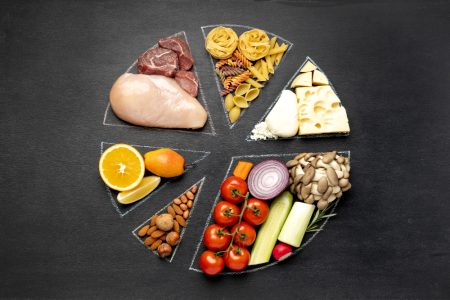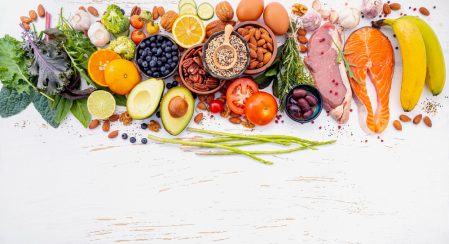1. Introduction to Daily Calorie Needs
What Are Calories and Why Do They Matter?
Calories are the units of energy that fuel your body. Every activity, from breathing to exercising, requires energy, which comes from the food and drinks you consume. Understanding how many calories your body needs is essential for maintaining energy levels, supporting growth, and managing your weight. Consuming too few calories can leave you fatigued and malnourished, while overeating may lead to weight gain and other health issues.
The Role of Age in Determining Calorie Needs
Age is a critical factor in determining how many calories you should consume daily. As you move through different life stages, your body’s energy requirements change. For example, children and teenagers need more calories to support rapid growth and development, while adults require energy to maintain bodily functions and daily activities. Older adults may need fewer calories due to slower metabolisms and decreased activity levels.
Additionally, age interacts with other factors, such as gender, activity level, and health conditions, to shape your overall calorie needs. Knowing how many calories your body needs by age allows you to make informed dietary choices tailored to your current stage of life.
This blog will explore how calorie requirements differ by age, offering clear guidance for various life stages. By understanding these needs, you can create a balanced diet that supports your health goals at any age. Whether you are a parent managing your child’s nutrition or an adult adjusting your diet, knowing how many calories you should eat daily can make all the difference in achieving a healthier lifestyle.
Affiliate Disclaimer
This blog post may include links to affiliate sites. If you click on an affiliate link and make a purchase, we may earn a small commission or receive other compensation at no extra cost to you. Please note that many of the links on our site are affiliate links. Our use of these links does not impact the products, services, or websites we recommend to you. This disclaimer covers all forms of communication with you, including our website, email, phone, social media, products, and other platforms.
Amazon Affiliate Disclaimer
We participate in the Amazon Services LLC Associates Program, an affiliate marketing program that allows us to earn fees by linking to Amazon.com and its affiliated sites. If you click on an Amazon affiliate link on our site and make a purchase, we may receive a small commission at no additional cost to you.
2. How Many Calories Do You Need?
General Guidelines for Calorie Intake by Age
How many calories you need each day depends on a variety of factors, but age is one of the most critical. The U.S. Department of Agriculture (USDA) provides general calorie intake guidelines based on age, gender, and activity level.
For children aged 2-3, calorie needs typically range from 1,000 to 1,400 calories daily. As kids grow, their calorie requirements increase significantly. By the time they reach their teenage years, boys may require between 2,000 to 3,200 calories per day, while girls generally need 1,600 to 2,400 calories daily.

Adults have relatively stable calorie needs, with women usually requiring 1,800 to 2,400 calories and men needing 2,200 to 3,000 calories, depending on their level of physical activity. For older adults, calorie needs decrease slightly as metabolism slows and physical activity often decreases. Women over 50 may need around 1,600 to 2,200 calories, while men in the same age range may need 2,000 to 2,800 calories.
These general guidelines give a starting point, but they don’t account for other factors that influence how many calories your body needs.
Factors That Influence Your Daily Calorie Needs
While age provides a baseline for how many calories you should consume, other factors come into play. These include:
1. Gender: Men typically have more muscle mass than women, which leads to a higher calorie requirement to maintain energy balance.
2. Activity Level: Someone who is highly active needs more calories than someone who lives a sedentary lifestyle. Physical activities like running, cycling, or heavy lifting can significantly increase your daily calorie expenditure.
3. Health Conditions: Certain health conditions, such as thyroid disorders or metabolic syndromes, can affect how efficiently your body burns calories. Individuals managing chronic illnesses may need to adjust their intake accordingly.
4. Body Composition and Weight Goals: Your body size and muscle mass influence how many calories you burn at rest. Additionally, those aiming for weight loss may need to create a calorie deficit, while those focusing on muscle gain may require a surplus.
Why Age and Activity Level Matter Most
As you age, your metabolism naturally slows, which reduces the number of calories your body burns at rest. This is why older adults generally need fewer calories than younger individuals. Activity levels, however, can offset this decline to some extent. For instance, a physically active senior might need more calories than a sedentary adult in their 30s.
It’s also essential to remember that children and teenagers, who are still growing, have higher calorie needs relative to their size compared to adults. Ensuring they get the right balance of nutrients alongside calories is vital for supporting healthy development.
The Importance of Personalized Calorie Needs
While general guidelines for how many calories you should eat by age provide a helpful framework, they don’t replace personalized advice. Everyone’s body is different, and a one-size-fits-all approach rarely works. Factors like genetics, metabolism, and lifestyle all play a role in shaping your unique calorie requirements.
Online calculators and tools can provide a more personalized estimate by considering your height, weight, activity level, and age. Many people also find it helpful to consult a registered dietitian to determine their exact needs, especially if they have specific health goals or concerns.
By understanding how many calories your body needs at different stages of life and how factors like activity level impact these requirements, you can create a diet that fuels your body efficiently. This awareness is key to maintaining energy levels, preventing unwanted weight changes, and supporting overall health.
3. How Many Calories for Different Life Stages
Calorie Needs for Children and Teenagers
Children and teenagers are in phases of rapid growth and development, which means their calorie requirements are higher relative to their size compared to adults. Understanding how many calories they need is crucial for supporting physical development, brain function, and overall health.
For young children aged 2-3, calorie needs range from 1,000 to 1,400 per day, depending on activity level. Preschool-aged children (4-5 years old) generally require about 1,200 to 1,600 calories daily. As they grow older, their needs increase.
Table of Daily Calorie Intake for a 50-Year-Old Woman to Lose 5 kg
| Activity Level | Calorie Requirement (Daily) |
|---|---|
| No Physical Activity (Sedentary) | 1,200 - 1,400 |
| 3 Times a Week Physical Activity | 1,400 - 1,600 |
| 5 Times a Week Physical Activity | 1,600 - 1,800 |
Table of Daily Calorie Intake for a 50-Year-Old Man to Lose 5 kg
| Activity Level | Calorie Requirement (Daily) |
|---|---|
| No Physical Activity (Sedentary) | 1,700 - 1,900 |
| 3 Times a Week Physical Activity | 1,900 - 2,100 |
| 5 Times a Week Physical Activity | 2,200 - 2,400 |
By the time kids enter their preteen years (ages 9-13), boys typically require between 1,800 and 2,600 calories daily, while girls need around 1,600 to 2,200 calories. These numbers reflect the demands of growth spurts and higher activity levels common during this age.
Teenagers, especially during puberty, experience the highest calorie requirements of their lives. Boys may need as many as 3,200 calories per day if they are highly active, while girls might need between 2,000 and 2,400 calories. It’s essential to provide not only enough calories but also a balance of nutrients, such as protein, calcium, and iron, to support healthy growth and energy.
Calorie Intake for Adults in Their Prime
For adults, calorie needs stabilize, but activity level and lifestyle become key factors. How many calories an adult needs varies significantly between individuals, depending on their metabolism, muscle mass, and daily habits.
Women typically require between 1,800 and 2,400 calories daily, while men need around 2,200 to 3,000 calories. Those who engage in regular exercise or have physically demanding jobs may need to adjust their intake upwards to maintain energy balance.

On the other hand, individuals with sedentary jobs or lifestyles may require fewer calories to avoid weight gain. Balancing calorie intake with nutrient-dense foods is vital during this stage of life, as adults need to maintain energy levels for work, family responsibilities, and leisure activities.
Adjusting Calories for Older Adults
As people age, their metabolism naturally slows, leading to reduced calorie needs. This change often begins in the late 40s or early 50s and becomes more pronounced over time. How many calories older adults need depends on their level of physical activity and overall health.
For women over 50, calorie requirements usually fall between 1,600 and 2,200 calories per day. For men in the same age group, the range is typically 2,000 to 2,800 calories. However, staying active can help counteract some of the decline in metabolic rate.
Sarcopenia, the natural loss of muscle mass with age, also plays a role in lowering calorie needs. Older adults should focus on consuming enough protein to preserve muscle mass while ensuring their calorie intake doesn’t lead to unintentional weight gain.
How Nutrition Complements Calorie Intake Across Ages
While knowing how many calories you need is essential, it’s equally important to focus on the quality of those calories. Across all age groups, a diet rich in whole grains, lean proteins, healthy fats, and fruits and vegetables supports long-term health.

For children and teens, the goal is to fuel growth and development. Adults benefit from a diet that sustains energy and helps prevent chronic diseases. Older adults, meanwhile, should prioritize nutrient-dense foods to support bone health, cognitive function, and overall vitality.
Final Thoughts on Calories Across Life Stages
Each life stage brings unique demands, and understanding how many calories you need at each phase helps ensure that your body gets the right amount of energy. Whether you’re planning meals for your child, adjusting your own intake as an adult, or helping an older loved one maintain a balanced diet, aligning calorie intake with life stage needs promotes health and vitality at every age.
4. How to Calculate Your Calorie Needs
Using Basal Metabolic Rate (BMR)
To determine how many calories your body needs daily, the first step is calculating your Basal Metabolic Rate (BMR). BMR represents the number of calories your body requires to perform basic functions like breathing, circulating blood, and regulating temperature while at rest. In essence, it’s the energy your body would use if you did nothing but rest all day.
Two commonly used equations for estimating BMR are the Harris-Benedict Equation and the Mifflin-St Jeor Equation. The latter is more widely adopted today due to its greater accuracy. Here’s how it works:
Mifflin-St Jeor Equation:
- For men: BMR = (10 × weight in kg) + (6.25 × height in cm) − (5 × age in years) + 5
- For women: BMR = (10 × weight in kg) + (6.25 × height in cm) − (5 × age in years) − 161
Once you’ve calculated your BMR, you’ll have a baseline for how many calories your body needs to function. However, this number doesn’t account for physical activity, which can significantly increase calorie requirements.
Incorporating Activity Levels into Your Calculation
The next step in determining how many calories you need is to factor in your activity level. This is done by multiplying your BMR by an activity factor that represents your typical daily physical activity. These activity levels are classified as follows:
- Sedentary (little or no exercise): BMR × 1.2
- Lightly active (light exercise 1-3 days/week): BMR × 1.375
- Moderately active (moderate exercise 3-5 days/week): BMR × 1.55
- Very active (hard exercise 6-7 days/week): BMR × 1.725
- Extra active (very intense exercise or physical job): BMR × 1.9
For example, if your BMR is 1,500 calories and you are moderately active, you would multiply 1,500 by 1.55, resulting in a total of 2,325 calories. This number reflects how many calories you need each day to maintain your current weight at that activity level.
Adjusting for Weight Goals
In addition to activity levels, your weight goals will also influence how many calories you should consume daily.
- To lose weight: You need to create a calorie deficit, meaning you consume fewer calories than your body burns. A general rule is to reduce your intake by 500–750 calories per day to lose about 1-2 pounds per week. However, it’s important not to go below 1,200 calories for women or 1,500 calories for men without medical supervision, as this can lead to nutrient deficiencies.
- To gain weight: You’ll need a calorie surplus, consuming more calories than your body burns. Adding 250–500 extra calories per day can support gradual weight gain, which is particularly helpful for building muscle.
Tools to Simplify Calorie Calculations
While calculating your BMR and activity levels manually is effective, there are numerous online tools and apps that make this process easier. These calculators typically ask for your age, gender, weight, height, and activity level to provide an estimate of how many calories you need.
Fitness apps, such as MyFitnessPal or Cronometer, go a step further by helping you track your calorie intake and output in real-time, offering a practical way to stay on track with your health goals.
Why Understanding Calorie Needs Is Essential
Knowing how many calories you need daily is more than just a number—it’s a foundation for making informed dietary decisions. Understanding your BMR, adjusting for activity levels, and aligning your intake with your weight goals empowers you to take control of your health.
Moreover, this awareness encourages mindful eating. Instead of following restrictive diets, you can create a sustainable plan that supports your energy needs while prioritizing nutrient-rich foods. Calculating your calorie needs is a practical tool that adapts to every life stage and health goal, ensuring that your body gets the right balance of energy and nutrition.
5. Tips for Managing Your Calorie Intake
Balancing Calories with Nutritional Value
Knowing how many calories you need daily is important, but it’s equally essential to focus on the quality of those calories. A diet rich in nutrient-dense foods ensures your body receives the vitamins, minerals, and macronutrients it requires to function at its best.
1. Prioritize Whole Foods:
Whole, unprocessed foods like fruits, vegetables, lean proteins, whole grains, and healthy fats should make up the majority of your calorie intake. These foods are packed with nutrients that support energy, metabolism, and overall health.

2. Avoid Empty Calories:
Foods high in added sugars and unhealthy fats, such as sugary snacks, sodas, and fried foods, provide calories but little nutritional value. Consuming too many empty calories can lead to weight gain and nutrient deficiencies, even if you stay within your daily calorie needs.
3. Use Portion Control:
Even healthy foods can contribute to excess calorie intake if portion sizes are too large. Learning to measure servings and being mindful of portion sizes can help you stay on track without feeling deprived.
Practical Tools to Track Your Daily Calories
In today’s digital age, technology makes it easier than ever to manage how many calories you consume. Tools and strategies that simplify calorie tracking can help you meet your health goals without becoming overwhelmed.
1. Calorie-Tracking Apps:
Apps like MyFitnessPal, Lose It!, and Cronometer allow you to log your meals and snacks, calculate their calorie content, and compare it to your daily target. Many apps also track your macronutrient intake, helping you maintain a balanced diet.
2. Food Scales and Measuring Cups:
Using a food scale or measuring cups can help you understand portion sizes more accurately. This is especially helpful when starting your calorie-tracking journey, as it eliminates guesswork about how many calories are in your meals.
3. Restaurant and Food Label Awareness:
When eating out or shopping, pay close attention to calorie information on menus and food packaging. Many restaurants now provide calorie counts for their dishes, helping you make informed choices that align with your goals.
Strategies for Eating Mindfully
Mindful eating helps you enjoy your food while staying aware of your calorie intake. It emphasizes paying attention to hunger and fullness cues, which can prevent overeating.
1. Slow Down Your Eating:
Eating too quickly can lead to consuming more calories than your body needs before you feel full. Take your time to chew your food thoroughly and savor each bite, giving your brain time to register fullness.
2. Avoid Distractions:
Eating while watching TV or scrolling through your phone can lead to mindless overeating. Focus on your meal to better recognize when you’ve had enough.
3. Plan Your Meals:
Meal planning ensures you know how many calories you’ll consume and helps you avoid impulsive, calorie-laden choices. Preparing balanced meals in advance also saves time and reduces stress during busy days.
Adjusting Calorie Intake for Life’s Changes
Your calorie needs can change due to various factors, such as weight goals, pregnancy, or lifestyle shifts. Regularly reassessing how many calories you need helps you stay aligned with your body’s requirements.
1. Adapting to Weight Goals:
If your weight changes significantly, revisit your calorie needs calculation to ensure your intake is still appropriate for your new weight.
2. Adjusting for Physical Activity:
Increased exercise or reduced activity levels can alter how many calories you need. Ensure your intake reflects your energy expenditure to maintain balance.
3. Life Stages and Health Conditions:
Pregnancy, aging, and health conditions like diabetes may require adjustments to your calorie intake and macronutrient distribution. Consulting a healthcare provider or dietitian can help you make the necessary changes.
Final Thoughts on Managing Calorie Intake
Effectively managing how many calories you consume each day is about balance and awareness. By focusing on nutrient-dense foods, using tools to track your intake, and eating mindfully, you can meet your health goals without feeling restricted. Adapting your approach as your body’s needs evolve ensures that you stay in control of your health and well-being at every stage of life.
6. Conclusion
Why Understanding How Many Calories You Need Matters
Understanding how many calories your body needs each day is a cornerstone of maintaining good health. Whether your goal is to manage weight, improve energy levels, or support overall well-being, knowing your calorie requirements allows you to make informed dietary choices.
Calories are more than just numbers—they’re the energy your body needs to fuel essential functions like breathing, digestion, and movement. Consuming the right amount helps you avoid health issues tied to undernutrition or overeating, such as nutrient deficiencies, fatigue, or weight-related conditions. Tailoring your calorie intake to your age, activity level, and lifestyle ensures that your body gets what it needs to thrive.
Making Informed Choices for Long-Term Health
While understanding how many calories you need is important, it’s equally crucial to focus on the quality of those calories. A diet rich in whole, nutrient-dense foods supports your body beyond just providing energy. Balanced eating habits, combined with an awareness of portion sizes and mindful food choices, can help you maintain a healthy relationship with food.
Your calorie needs may change throughout your life, but a flexible and informed approach will help you adjust. Regularly reassessing your intake as your lifestyle or health goals evolve ensures you stay on track.
By knowing how many calories you need and aligning your diet with that number, you can create a sustainable plan that promotes energy, health, and vitality—today and in the years to come.


